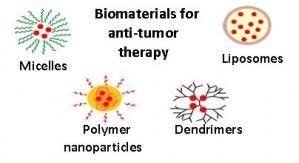Dec 20 2018
The Royal Swedish Academy highlighted the significance of research regarding the role of the immune system in the development and treatment of oncological diseases.
 Biomaterials for anti-tumor therapy (Image credit: Lobachevsky University)
Biomaterials for anti-tumor therapy (Image credit: Lobachevsky University)
The academy recently named Tasuku Honjo and James Allison as the recipients of the 2018 Nobel Prize in Physiology or Medicine for introducing a new, effective method to destroy cancer by treating the immune system instead of the tumor.
In recent years, it has been shown that the effectiveness of current anti-cancer therapy approaches—for instance, chemotherapy and/or radiation therapy—increases when the applied treatment causes cell death through the immunogenic cell death (ICD) pathway, which is linked to the stimulation of the body’s anti-tumor immune response, leading to full elimination of the tumor.
Immunity is known to play a critical role in the body’s fight against cancer. Each day, the cells of the immune system monitor all the body’s cells for “normalcy” and destroy the degenerated cells. At times, the cells tend to hide from the immune system and escape the immunological control, following which a tumor develops. Currently, a wide range of methods are available to tackle tumors; however, most often, these have shown to be incurable. Yet, a new study has demonstrated that if the immune system ultimately starts to see a tumor, then the body can get the ability to win the fight with it. This is why immunogenic cell death has become a subject of intense research for scientists at Lobachevsky University in Nizhny Novgorod (Russia).
The release of damage-associated molecular patterns (DAMPs) and/or chemokines/cytokines by the dying cells characterize the immunogenic cell death, thus introducing a powerful anti-tumor immune response. Moreover, cells that die during the process of immunogenic cell death serve as vaccines by triggering the immune system, which consecutively creates a specific anti-tumor T-cell immune response. Hence, a great deal of research is now ongoing in experimental cancer therapy targeted at boosting the immunogenicity of dying cancer cells via the application of biomaterials to achieve targeted delivery of anti-tumor agents.
A research team from Lobachevsky University (UNN) under Ghent University Professor Dmitry Krysko, a leading researcher at the Department of General and Medical Genetics of the UNN Institute of Biology and Biomedicine, has recently published a review article titled “An emerging role for nanomaterials in increasing immunogenicity of cancer cell death”) in the journal BBA - Reviews on Cancer. This article reveals the current concepts regarding the possibility of applying nanomaterials in cancer treatment, including their capability to trigger an immunogenic form of cancer cell death—the so-called ICD.
Maria Vedunova, Director of the UNN Institute of Biology and Biomedicine, stated that the article emphasizes the fundamental principles of the idea of immunogenic cell death and its molecular basis, and it also discusses the possible application of DAMPs as effective biomarkers of anti-cancer therapy.
The paper also shows the diversity of types and structures of biomaterials used in the development of new therapeutic strategies, and discusses their role in increasing the effectiveness of chemotherapy. In particular, the results of experimental work on animals are presented, proving that the immunogenicity of chemotherapeutic agents can be increased by using biomaterials (nanoparticles of various types, liposomes, etc.) for their delivery. In turn, it leads to a decrease in the risk of metastases and an increase in the long-term survival rate. Besides, the use of biomaterials allows for the delivery at the same time of both a chemotherapeutic agent and adjuvants (for example, the agonists of the main components of the innate immune system—toll-like receptors (TLR) and indoleamine 2,3-dioxygenase (IDO) inhibitors), which can enhance the role of immune responses in relation to cell death occurring through the immunogenic pathway.
Maria Vedunova, Director, UNN Institute of Biology and Biomedicine.
Tatiana Mishchenko, senior researcher at the UNN Laboratory for creating neuroprotection techniques, added that there is another benefit of utilizing biomaterials: to apply targeted delivery of a chemotherapeutic agent to tumor cells and thus considerably boost the drug content in the tumor and reduce its toxicity level to normal body cells. “Encapsulation of drugs in nanoparticles also prevents the accumulation of drugs in vital organs (for example, in the heart and intestines) and allows for the use of higher doses, which is impossible when using a free drug that has pronounced side effects,” explained Tatiana Mishchenko.
The study is highly significant for the development of useful drugs. Within the context of the study, all the latest concepts have been obtained regarding the immunogenic cell death phenomenon that is extremely crucial from the standpoint of the fight against cancer.
More clinical trials and studies will demonstrate whether the use of biomaterials will indeed provide the optimal method for controlling the immunogenicity of dying cancer cells and will give the required information to come up with novel cancer treatment methods, especially, the therapeutic concept of triggering the immunogenic cell death in the case of glioma, which is one of the most aggressive brain tumors.